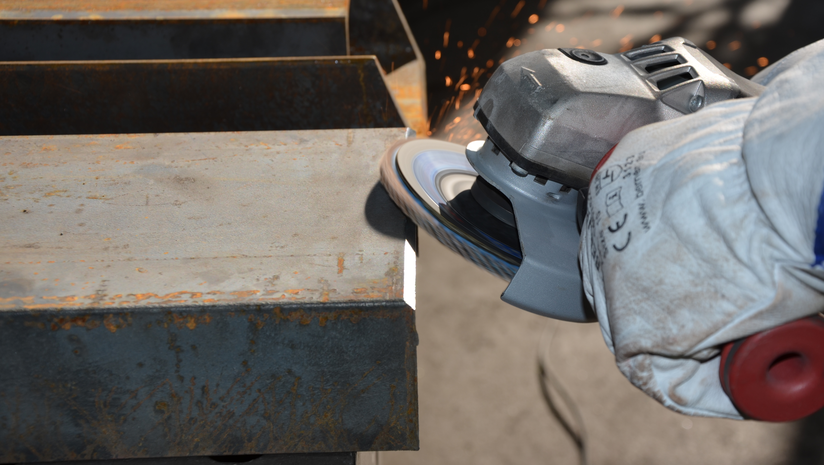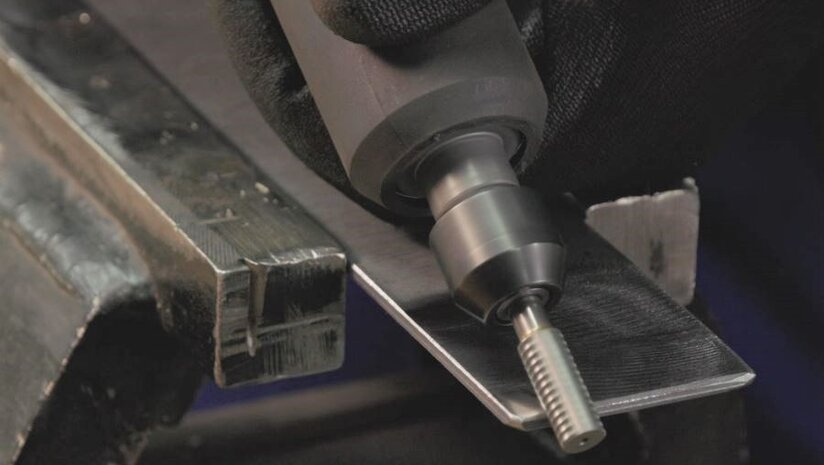
Beveling
If two workpieces are to be welded together, the edge of the workpieces must first be broken by a beveled surface. This is done by machining. The result is a chamfer, also known as a bevel.
What is beveling and
why is it important?
If two workpieces are to be welded together, the edge of the workpieces must first be broken by a beveled surface. This is done by machining. Or in other words, a space is created to accommodate the individual welding layers through which the workpieces are joined together. The bevel can have different shapes. The V-joint, the double V-joint, and the Y-joint are the most common shapes.
Which tool is used for beveling?
The position of the weld, the material of the workpiece, and the types of drives available - the choice of the right tool depends on various factors.
If an angle grinder is available, the beveling can be done with sulfur- and iron-free Osborn flap discs. Flap discs with a conical or straight shape are available. The angle on the workpiece determines the shape of the flap wheel.
If a workpiece made of non-ferrous metal is to be beveled, we recommend an abrasive cloth with a cooling bond as it reduces blue tarnish.

Pictured: Beveling with an Osborn flap disc.
If a straight grinder or air grinder is available, chamfering can be done with carbide burrs. The milling head is made of tungsten carbide-cobalt, the shank of tool steel. Different head shapes and toothings ensure that there is the right solution for every application.
For chamfering, burrs with cross serration (Z6) are the best choice. It ensures high stock removal in a short time. If the surface quality is important, a single tooth (Z3) is recommended. In the shipyard sector, the special shipyard toothing is often used. Compared to the Z6 toothing, it has a 30% higher material removal rate.

Camfering with a carbide burr.
Products for
Beveling.

VLRS V-Grooved - Concentric Stud Style, Inch Sizes
A V-Grooved Stainless Steel Cam Follower is a type of roller bearing that is made of stainless steel. It has a cylindrical stud as the inner raceway and an outer raceway shaped like a V-groove that provides a means of tracking a cam or similar rotating component. The V-groove provides positive engagement with a rotating cam, while the stud provides a simple and reliable solution for installations where a specific and consistent orientation of the bearing is required. The use of stainless steel in the construction of the cam follower provides excellent resistance to corrosion and other types of chemical degradation, making it suitable for use in harsh environments. This type of cam follower is commonly used in a wide range of applications, including food processing equipment, pharmaceutical machinery, and equipment used in marine and offshore environments.

VLRSE V-Grooved - Eccentric Stud Plain Style
A V-Grooved Stainless Steel Eccentric Cam Follower is a roller bearing with an eccentric stud and V-groove outer raceway, made of stainless steel for corrosion resistance. Used for precise load distribution and positioning in precision components, robotics, automation, and aerospace/defense applications.
Garnet Abrasive Wheel
The Garnet Abrasive Wheel is a convolute wheel built by winding layers of a non-woven abrasive around a round core. The abrasive material is created by extruding fiber strands, resin and garnet mineral. With the softer organic minerals, garnet is a good match for woodworking applications, because it produces finer finishes than synthetic minerals. Ideal for the removal of mill/knife marks and chatter. Operating pressure and speeds are low to prevent burning.
Flex Brush
An open mesh construction makes them ideal for applying finishes. Blending Stainless Steel surfaces to a #4 RMS finish is one the most common applicaitons
Crimped Concave Wire Wheel Brush with Shank
Crimped Concave Wire Wheel Brush with Shank
HPC Plain - Concentric Stud Style - Metric Sizes
A Plain Concentric Stud Style Cam Follower is a type of roller bearing that has a cylindrical stud as the inner raceway, with the outer raceway being a cylinder that is concentric with the stud. This design provides a simple and reliable solution for light to medium load applications where a low profile and minimal axial space are required. The stud allows for easy installation, and the plain (non-flanged) outer surface provides minimal axial height, making it suitable for applications with tight installation constraints.

Silice-Free Bar Compound
In addition to their safety benefits, Osborn's silica-free compounds offer enhanced performance characteristics compared to traditional silica-containing formulations. These innovative compounds deliver superior results, providing a clearer and smoother appearance for the final product. Whether you're in manufacturing, construction, or automotive industries, our silica-free compounds will help you achieve outstanding outcomes while ensuring the well-being of your workers.

Silica-Free Liquid Compound
In addition to their safety benefits, Osborn's silica-free compounds offer enhanced performance characteristics compared to traditional silica-containing formulations. These innovative compounds deliver superior results, providing a clearer and smoother appearance for the final product. Whether you're in manufacturing, construction, or automotive industries, our silica-free compounds will help you achieve outstanding outcomes while ensuring the well-being of your workers.

TY™ Encapsulated Cup Brush with Shank - Standard Duty
Osborn’s TY™ Encapsulated Cup Brush with ¼” Shank is constructed with proprietary TufWire™ with a specially formulated polymer that supports wire strands. The result is maximum performance with minimum pressure. Shank allows brush to be easily mounted to portable tools. Note: As a safety precaution, the shank must be fully inserted into the chuck or collet and tightened securely.

TY™ Encapsulated Cup Brush - Standard Duty
Osborn’s TY™ Encapsulated Cup Brush is constructed with proprietary TufWire™ with a specially formulated polymer that supports wire strands, resulting in maximum performance with minimum pressure.

Knot Wire Cup Brush w/ Bridle - Heavy Duty
Designed for toughness and longevity, Osborn’s heavy duty Knot Wire Brush with Bridle provides rugged and efficient use on a variety of maintenance or cleaning applications. Featuring proprietary TufWire™ and a bridle to reduce the flare of wires, these brushes provide a more aggressive brush face for rigorous tasks. Bridles can be removed after partial wear for longer brush life and continued uniform performance.